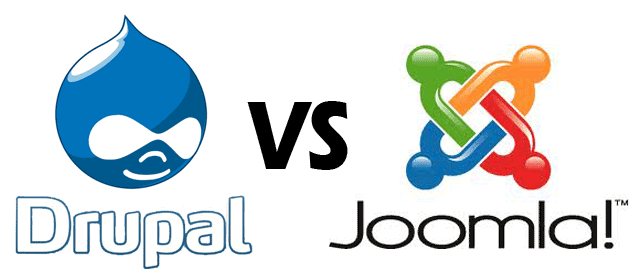Choosing the Right CMS for Your Business Needs: Joomla vs Drupal
5 mins read
For organizations that have less content to post and manage on the web, a blog tool like WordPress may be sufficient. But for companies that have a larger amount of content to manage or need integration with ecommerce as well as with other external or internal applications, a more extensive Content Management System (CMS) is required.
The two most popular open source CMS solutions used on the Web are Joomla and Drupal. Both of them offer plenty of features for users to customize their websites and they have almost the same functionalities. Both Joomla and Drupal are free and open source Content Management Systems. But each of them has their own strengths, weaknesses and unique features. It is important for you to choose the one that best suits your business needs.
Joomla is known for its ease of use and installation. You do not need any programming experience to build websites using Joomla. It offers a one-click installation for websites, allowing you to set up a site within a few minutes. The interface is very user-friendly and it allows new sites to be easily managed and updated with a variety of extensions. It is well suited for small ventures and startups.
Drupal is considered to be less user-friendly. It requires a lot of time to get used to it. It is known for its robust code and has varieties of rich add-ons. Drupal is mostly used in many large and corporate business environments.
Here is a comparison of Joomla and Drupal to help you analyze and choose the right CMS for your business needs.
Visual CMS
Looking at the visual medium, Joomla is always the best visual CMS. There is a choice of more than thousands of free and commercial templates, that can be worked out and personalized with very less effort if you have a little knowledge of CSS. You can revamp a template if you know some CSS for CMS and some gfx tools. It is quicker and easier to get a good-looking site with Joomla than with any other CMS.
On the other hand, Drupal does not offer any big choice for templates. The templates are neither great nor impressive and altering them is hard. There might be some issues with different template engines in different Drupal versions.
Ease of Use
Joomla has a great graphical interface and is the most user-friendly CMS. It is the easiest full-feature CMS for the site owner or the webmaster. The admin usability is good in Joomla. Even non-technical people can use Joomla without any effort and clients can be trained to use it too.
In contrast, Drupal is not so easy to handle. You need some technical knowledge to work with or install the modules of Drupal. The admin interface is text-driven and is often confusing to beginners. It is difficult to manage the site when any kind of ACL (Access Control List) is used.
Stability
Drupal is highly stable when compared to Joomla. It scales well and can handle a heavy load. When the server is overloaded heavily, it shuts itself down for the time being and handles all the requests soon after the server comes under the limit of its traffic capacity. It does not crash when dealing with an overload.
Joomla, does not scale as well as Drupal does. It cannot cope with a large number of plugins or with incompatible ones, high page numbers and heavy loads. Many plugins are not of high quality in Joomla. Joomla is not so stable when heavily extended.
Performance
When it comes to performance, Drupal always stays on top. The powerful and coarse structure of Drupal makes it easy to manage any kind of issues.
Joomla lags behind in performance when compared with Drupal.
Security
Joomla offers a dedicated community that provides updates and fixes as soon as problems occur. Your website is secure if you use up-to-date extensions and configure your website properly.
Drupal users subscribe to the security mailing list in order to stay informed of the security advisories. The vulnerabilities are found and fixed even before they conquer any live website. A survey says that more than 90% of security-based issues are caused by user-made modules and themes in Drupal.
In a nutshell, Drupal will be a better choice for large corporate use that depends on core functionalities. Joomla will be the right choice when there is a need for ecommerce support, multimedia controls, rich templates access and for easier management by a less experienced team.
Dot Com Infoway is a Web Development company that has developed many popular websites. To know more about our services, visit our Web Development and Web Design pages.
Related Articles:
- Surveys Find WordPress Most Popular CMS
- Ultimate Checklist for SEO Friendly CMS
- Infographic: The Most Popular CMS for Your Business Needs
Latest Posts
Get the latest insights from Dot Com Infoway straight to your inbox.






![The Game Marketing Guide: Pre and Post-Launch Strategies [Infographic]](https://www.dotcominfoway.com/wp-content/uploads/2023/09/DCI-Game-Marketing-blog-1.jpg)















